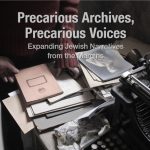 Vienna Wiesenthal Institute (VWI) (Web)
Vienna Wiesenthal Institute (VWI) (Web)
Time: 17.-19.11.2021
Venue: Vienna Wiesenthal Institute and virtual space
Hybride workshop with the support and cooperation of the Leo Baeck Institute (New York/Berlin), the Rothschild Foundation Hanadiv Europe, Frauen- und Geschlechtergeschichte Historisch-Kulturwissenschaftliche Fakultät, and the Institute for East European History of the University of Vienna.
Keynote
- Natalia Aleksiun (Centre for Jewish Studies, Univ. of Florida): When Fajga Left Tadeusz. Precarious Voices on Wartime Relationships
Panels
- Gendered Experiences of the Holocaust: Between Violence and Resistance
- New Methods and Materials: Digital Approaches
- Gendered Experiences of the Holocaust: Women’s Voices
- New Methods and Materials: Between Art And Archive
- Hidden Heritage, Endangered Archives
- Gendered Experiences of the Holocaust: LGBTIQ*
- Narratives Of The Marginalized: Recovering Micro-Histories
Full programme
Recent years have seen ground-breaking archival survey projects taking place across Europe, in a range of public and private archives, revealing a wealth of documents related to Jewish history and the Shoah which remained hidden or inaccessible until now. Simultaneously, scholarly definitions of archives are expanding, and methodologies used for approaching archival material are complementing this expansion.
The archival turn in contemporary art, the opening of archives in Eastern Europe, the third generation’s ongoing quest to interpret fragments of familial papers, and the new digital availability of smaller archival collections suggest that our access to historical material and sources has been democratised. Expanding definitions of source material have animated researchers to implement new methodologies for reanalysing old narratives or examining narratives marginalised until now.
What overlooked stories are being found in newly accessible archives and how can they be framed and presented? How can new sources be approached and what issues or hurdles arise in working with „new“ material? To what extent must the history of the archival material itself be incorporated into an analysis of the same? This workshop seeks to make visible voices which have been unheard until now and discuss new methodological lenses demanded by this material. A particular emphasis is put on papers exploring gender dimensions in their work and interdisciplinary approaches.
Zoom link: https://us02web.zoom.us/j/8151337039
